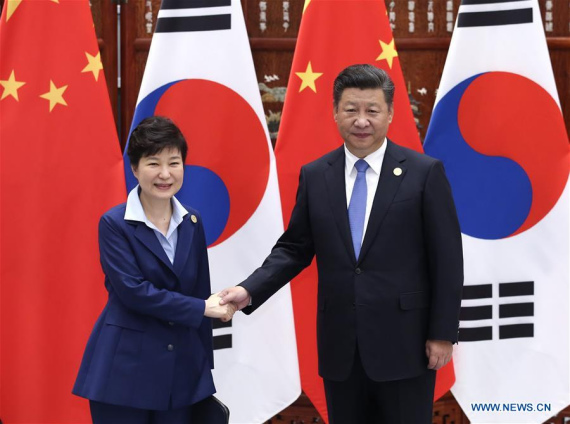
Chinese President Xi Jinping (R) meets with President of the Republic of Korea (ROK) Park Geun-hye, who is here to attend the Group of 20 (G20) summit, in Hangzhou, capital of east China's Zhejiang Province, Sept. 5, 2016. (Xinhua/Pang Xinglei)
China opposes the United States' deployment of the THAAD anti-missile system in the Republic of Korea (ROK), President Xi Jinping told ROK President Park Geun-hye on Monday. [Special coverage]
"Mishandling the issue is not conducive to strategic stability in the region, and could intensify conflicts," Xi said in Hangzhou.
Park said the ROK is willing to keep close communication with the Chinese side on the issue.
Xi reaffirmed China's commitment to achieving denuclearization on the Korean Peninsula, safeguarding peace and stability of the peninsula, and solving relevant issues through dialogue and consultation.
He urged adherence to the six-party talks platform, addressing the concerns of various parties in a comprehensive and balanced way, treating both symptoms and root causes, and realizing long-term peace and stability in the peninsula.
Calling China and the ROK "close neighbors with broad common interests," Xi said both sides share long-term interests in common development and regional peace.
He noted that in the 1930s a Korean interim government had stayed in Hangzhou for three years in the fight against Japanese aggression.
Xi welcomed Park's attendance to the G20 summit "in such a place with historic significance in bilateral relations."
The Chinese president praised the "leapfrog development" of bilateral ties and the great benefits for people on both sides since the two countries established diplomatic relations 24 years ago.
China and the ROK should cherish their political mutual trust, safeguard their cooperative foundations, and overcome difficulties and challenges to put bilateral ties on the right track toward stable and healthy development, Xi said.
"China is willing to work with the ROK to better protect and advance their hard-won ties," he said, while expressing hopes that the two countries will strive to "expand cooperative and positive elements and put a lid on negative ones."
He said both countries should respect each other's core interests to ensure stable ties.
They should also seek common ground while putting aside differences to cultivate a favorable environment for common development, and strengthen cooperation on regional and global issues to bolster common interests, Xi said.
China is ready to deepen cooperation with the ROK under multilateral frameworks and step up coordination on hot spot issues, he said.
Park said bilateral relations have followed the route designed by the leaders of the two countries and brought about regional prosperity. To develop ROK-China friendship is the general trend of the times.
The ROK attaches high importance to the ties with China and is committed to deepening mutual trust, she said. China and the ROK should seize the opportunity of the 25th anniversary of diplomatic relations next year to deepen their strategic cooperative partnership. (Updated)


















































